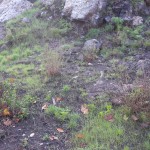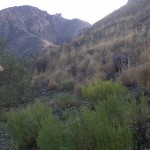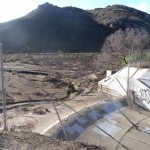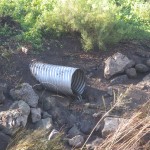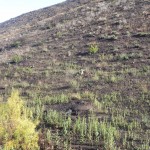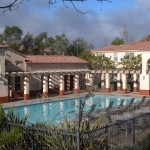In the Spring 2015 I will teach a graduate course in Algorithms. This course is an introduction to the art of algorithm analysis, intended for both Computer Science and Mathematics students. It will cover the main families of algorithms: Greedy, Dynamic Programming, Divide and Conquer, Online, and Randomized. The course will present all the necessary background, and it is intended to be a fun introduction to the fundamentals of this beautiful field. For more details see:
Blog
Rainfall overnight in University Glen
German universities: Between great and so-so
A GLANCE at the global rankings of universities suggests that nothing much has changed in recent years. MIT, Stanford, Cambridge, Oxford and a few other English-speaking campuses remain at the top, fighting it out with large endowments, celebrity professors and selective entry. By contrast, universities in Germany are nowhere near the top, even after several reforms, including an “excellence initiative” since 2005. Many students waste away in overflow rooms next to packed and stuffy lecture halls. Their best hope of seeing professors is through opera glasses.
But look more closely at the rankings, and change is more evident, thinks Günther Zupanc, a biology professor who has taught in Germany, Britain and Canada and is now at Boston’s Northeastern University. Only a couple of German universities make it into the top 50: Heidelberg’s Ruprecht-Karls-University and Munich’s Ludwig-Maximilians-University usually lead the pack. Among the top 200, however, German universities have improved the most. Taken together, they have moved up by 250 places, Mr Zupanc calculates. Only Dutch universities have done better. America’s, by contrast, have crashed: since 2011 they have collectively moved down by 692 places.
via German universities: Between great and so-so | The Economist.
Researchers quantify the S in HTTPS
Researchers from Pittsburgh’s Carnegie Mellon University, Polytechnic University di Torino in Italy, and the research and development arm of Spain’s Telefónica Group have published a paper investigating the impacts of HTTPS use for industry and web users.
The paper, The Cost of the “S” in HTTPS PDF, was presented at ACM CoNEXT in Sydney, and suggests that while the use of HTTPS is increasing due to mounting security concerns, it could result in more latency online, greater battery drain for some connected devices, and the loss of in-network value-added services.
The paper asserts that HTTPS “does not come for free”, with the researchers saying that HTTPS “may introduce overhead in terms of infrastructure costs, communication latency, data usage, and energy consumption”.
The encryption offered by an HTTPS address may protect information from “man-in-the-middle” attacks, but that same functionality can hamper the application of “middlebox” network appliances, such as firewalls.
Cyberattack could cost Sony Pictures tens of millions of dollars
The financial cost of the crippling cyberattack that hit Sony Pictures Entertainment last week is beginning to become clear — and it won’t be cheap.
The Culver City film and television studio could face an outlay of tens of millions of dollars, according to digital security and legal experts.
Such an expenditure comes at a poor time for the Sony Corp.-owned studio, which late last year committed to slashing overhead by at least $250 million and has since gone through several rounds of layoffs.
Sony Pictures’ costs include rebuilding its computer network, paying a cyber-forensics firm to investigate the breach and footing the bill for potential legal matters that stem from the attack.
via Cyberattack could cost Sony Pictures tens of millions of dollars – LA Times.
Job posting at AeroComputers
At AeroComputers, we believe that our Law Enforcement, Search and Rescue, Fire Fighters and other public service customers should have the best possible equipment to help them do their jobs. To that end, since 1993 we’ve been providing these customers with moving map systems that install into their airborne units, even before such systems were readily available through GPS. All of these components integrate with a camera gimbal to combine real-time video with moving maps to provide situation awareness. For the past couple of years, AeroComputers has been integrating 3D graphics, synthetic data and other useful layers to improve our capability in response to market demand.
Our company is currently experiencing growth and we need to expand the development team and strengthen our capabilities in 3D mapping. Candidates must have C++, Windows, Visual/Studio, OpenGL, Scene Graph, Qt, and GIS Development skills. Video, MS SQL, and real-time skills are nice to have as well. It is 30-40 hours per week, and will be mostly telecommuting with our software engineering staff.
The pay for this position will depend upon experience and we are currently interviewing candidates, hoping to fill the position soon. If any of your students are interested, please have them submit a resume and cover letter to my email address.
The job posting ID is 15437, go to: http://www.aerocomputers.com
iD Tech a STEM focused summer education program
You’re upbeat, tech-savvy, and you understand the need for quality technology education for students. Why not spend your summer mentoring, building your resume, and having quirky fun? We (iD Tech) are looking for over 1400 staff this summer. Are you one of them?
NEW scholarships in engineering related fields for Ventura county
The National Engineer’s Week Committee of Ventura and Santa Barbara Counties will award a limited number of scholarships, based on the availability of funds, to academically meritorious or needy students. If your grades are good (GPA 3.0 or better), you should apply! We evaluate every application on the merits and background of the individual. The scholarships may range from $500-$1,500.
Check here for details: http://www.newc-vsb.org
The Economist explains: How to trace a cyber-weapon
THE internet has changed all sorts of industries, from book delivery to newspaper publishing to pornography. And spying is no exception. On November 23rd Symantec, an American anti-virus firm, announced the discovery of Regin, a complicated piece of malicious software that has been lurking on computer networks in Russia and Saudi Arabia (among other places), stealing whatever secrets have come its way. Only a couple of weeks before, Kaspersky Labs, another anti-virus firm, revealed the existence of DarkHotel, another piece of espionage-ware that targeted corporate bosses and other bigwigs staying at hotels in Asia. Both pieces of software are slick, sophisticated and complicated. For that reason, the anti-virus firms think they are the work of nation states. DarkHotel has been tentatively pinned on South Korea. Regin is thought to be the work of the British, possibly with help from the Americans. But how do anti-virus researchers know where viruses come from?
via The Economist explains: How to trace a cyber-weapon | The Economist.
Digital privacy: Cryptography for dummies
A CAMPAIGN by American and British lawmakers and security officials to get social-media companies to take more responsibility for handing over information about criminals and terrorists using their networks gathered pace this week.
via Digital privacy: Cryptography for dummies | The Economist.


